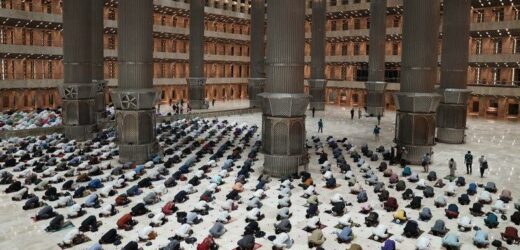Jakarta: It is dawn in Jakarta and the sound of the adzan, the Islamic call to prayer, is blaring from the loudspeakers of mosques around the metropolis.
A routine central to the faith of the 230 million Muslims across the Indonesian archipelago, the ancient call will be repeated for each of the five prayers during the day, just as it is across the Muslim world.
A man walks past the Ramlie Musofa mosque in Jakarta.Credit:AP
Typically, it will last about two to three minutes each time, although it can continue for as long as an hour, particularly before sunrise when it is also used to wake people up.
But while it may be a warmly familiar sound to many of the capital’s more than 9 million devotees of Islam, the noise of mosque speakers has long been a point of contention in the Muslim-majority country, particularly in a megacity such as Jakarta, where mosques lie close to one another and the adzan is not delivered in unison.
“In Jakarta alone there are more than 3000 mosques … and they don’t do it at the same time,” said Imam Addaraqutni, secretary-general of the Indonesia Mosque Council.
“There are a few minutes’ difference between each mosque. So every time the call to prayer is made, it becomes quite noisy. Bear in mind the distance between mosques in Jakarta is very close, so the call to prayer from ‘mosque A’ goes in our left ear and the call of prayer from ‘mosque B’ goes in our right ear.”
“Mr [Kalla] once said that a house that is located near a mosque will have its selling value dropped because it’s noisy”
It is why the mosque council is seeking to make a significant change by proposing a simultaneous and centralised call to prayer in major centres, relayed from one mosque to thousands of others at the same time.
The proposal stems from an ongoing review of how mosque noise can be moderated, led by council chairman Jusuf Kulla, who has twice been vice-president of Indonesia, in the first terms of Susilo Bambang Yudhoyono and Joko Widodo.
Addaraqutni describes the mosque loudspeaker as an “institution” but said “even the Islamic community wants a kind of order”.
“Honestly, it also disturbs Muslims,” he said. “In some instances, the dawn call of prayer goes for about an hour while the ones who turn on [the recording] go back to sleep but they sort of ask other people to wake up and do the dawn’s prayers.
Worshippers socially distancing inside the Istiqlal Mosque in Jakarta.Credit:Bloomberg
“Mr [Kalla] himself assigned some people to record the sound of the loudspeakers at dawn. It is like someone’s rooster crows in his neighbour’s garden at dawn. The blaring sound goes on and on. I don’t mean to liken a call of prayer to a rooster’s crows. What I mean is that the sounds go one after the other.”
The noise from mosques’ outward-facing speakers has been a delicate subject in Indonesia, the world’s largest Muslim-majority country, particularly amid rising religious conservatism and concerns about waning tolerance of minority faiths.
People are wary of talking about it, fearing being charged and jailed for blasphemy, as was the case with a 44-year-old ethnic Chinese woman in North Sumatra province in 2018 when she was sent to prison for 18 months for complaining to a neighbour about the noise from a mosque near her house.
‘Honestly, it also disturbs Muslims.’
Aside from falling foul of the law, such complaints risk triggering public outrage.
In May, a man in Tangerang, a city on the western fringe of Jakarta, asked for the position of the speaker outside his local mosque across the street to be adjusted.
“Please move it a little bit so the sound won’t go directly [into my house],” he told the news outlet Detik of his request to the mosque.
In response, angry locals from an adjoining village raided his neighbourhood and, to settle the tension, he apologised on video, flanked by local police and military personnel for his protection.
Only a week earlier a man’s protest outside a mosque about the sound coming from its speakers during a Koran recital was met with fury by two other men, with the incident captured on a video clip that went viral.
The Sydney Morning Herald and The Age spoke to several Jakarta residents about mosque noise but none wanted to have their full name published.
Former Indonesia vice president Jusuf Kalla (right) with his then US counterpart Mike Pence in Jakarta in 2017.Credit:AP
Tina, a housewife and mother of two in East Jakarta, said she didn’t mind the sound of the call to prayer itself.
“After eight years living here, I can just ignore it. The problem is with the use of the external loudspeakers for events held inside the mosque. Why should we listen to the events?” she said.
“We are surrounded by mosques here. In less than the radius of 700 metres there are five mosques.“
Wenny, who lives in Depok, West Java, said there were three mosques within 100 metres of her home – one big and two small.
A man walks near a mosque in Jakarta, Indonesia.Credit:AP
“But the loudspeakers are very loud,” she said. “When my dad was still alive he often criticised them. It was not about the adzan but the sermons shouted out through the loudspeakers.”
Kalla, the mosque council chair, has asked that the call of prayer should be completed in no more than five to seven minutes. The organisation is also going to distribute stickers with guidance about the maximum decibel levels that loudspeakers should reach. Mosques have also been asked to use their internal speakers for events such as sermons and Koran readings, although that can be a challenge when as many as 500 people attend spilling the audience outdoors.
“For mosques that are less than 500 metres apart, it should be less than 50 decibels but mosques in villages that are quite far from houses can do higher than that,” said Addaraqutni, the mosque council’s secretary-general.
The proposal to synchronise the call to prayer across an area such as Greater Jakarta or the Surabaya metropolitan region is still to be put to the Ministry of Religious Affairs, provincial governments and other religious organisations and would need the approval of the Indonesian Ulema Council, a group of scholars that oversees Islamic affairs.
But if brought into practice it would mean the adzan would be broadcast from a venue such as Jakarta’s Istiqlal Mosque, the largest in south-east Asia.
“The Istiqlal Mosque has good muezzins [person who performs the call to prayer] who have good voices because it is a national mosque. So we have to provide transistors for the mosques to relay the call of prayer from there,” Addaraqutni said.
“What we want is for there to be no kind of competition of loudspeaker volume among mosques. It is meant to reduce the noise but at the same time we can carry out our religious obligations well.
“If we [agree] to do it we are not alone because other countries like Jordan do it too. I saw it when visiting Amman that they did the centralised call of prayer even though Amman has fewer mosques than Jakarta.”
The sensitivity of the issue, however, dictates that Islamic authorities are treading carefully.
Addaraqutni said there would be no formal regulations imposed and noise mitigation would be sought more in the form of an appeal to mosques.
Abdul Manan Ghoni, who sits on the executive board of Nahdlatul Ulama (NU), a Muslim organisation with an estimated 90 million members, said imposing rules would be problematic.
“The mosques in Indonesia are unlike mosques in other Islamic countries. The mosques in Indonesia are privately built by people while those in other countries are built by the government,” said Ghoni, the head of NU’s mosque and Islamic propagation unit and also a member of the mosque council’s executive board.
“I think we must first give some explanation to get a common understanding about the use of speakers in accordance with Islamic sharia. If the government abruptly announces a regulation many will politically protest. People may think that the government is anti-Islam.”
Ghoni believes, however, that a more streamlined approach to the call to prayer would be useful in big cities.
“I think all of us may agree to it but we must first sit together,” he said.
Get a note directly from our foreign correspondents on what’s making headlines around the world. Sign up for the weekly What in the World newsletter here.
Most Viewed in World
From our partners
Source: Read Full Article






